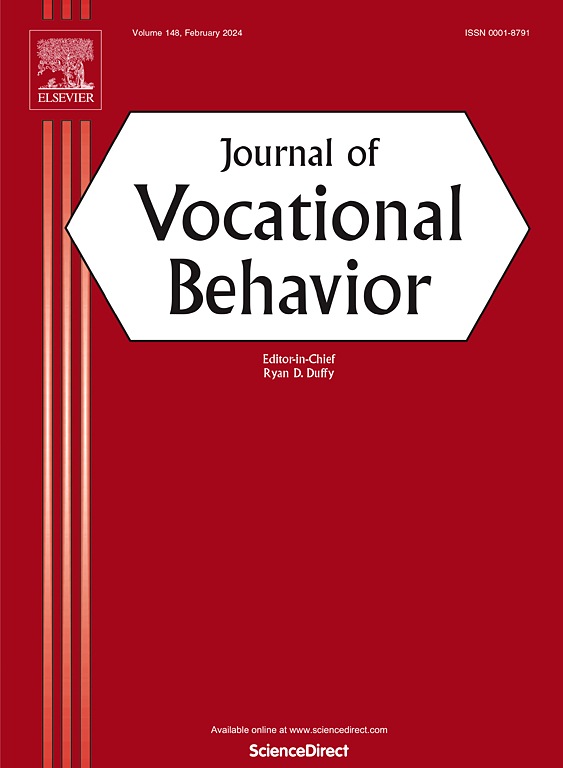Newcomer psychological health profiles: A Latent Transition Analysis
IF 5.2
1区 心理学
Q1 PSYCHOLOGY, APPLIED
引用次数: 0
Abstract
Rather than focusing on performance as the ultimate outcome in organizational and vocational research, it has been argued that psychological health represents a far more relevant outcome given its pervasive impact on employee's lives, including their work performance. This longitudinal study examined the various combinations of work and non-work psychological health indicators observed among distinct profiles of newly hired employees (N = 604; Mage = 42.34; 53.4 % males). This study also assessed the stability and generalizability of employee profiles and profile membership over a six-month period. Latent profile analysis revealed six stable newcomer profiles: Apathetic, Detrimental, Normative-Comfortable, Optimal, Workaholic, and Distressed. Newcomer socialization, particularly in relation to the organization and workgroup functioning, were linked to membership into profiles characterized by more favourable psychological states. The profiles were also related to turnover intention, performance, and physical symptoms, highlighting the connection between negative psychological states and adverse outcomes at the organizational and individual levels.
新移民心理健康概况:一个潜在的过渡分析
在组织和职业研究中,人们没有把绩效作为最终结果,而是认为心理健康代表了一个更相关的结果,因为它对员工的生活,包括他们的工作绩效产生了广泛的影响。本纵向研究考察了不同类型新聘员工的工作和非工作心理健康指标的不同组合(N = 604;法师= 42.34;53.4%男性)。本研究还评估了六个月期间员工简介和简介成员的稳定性和普遍性。潜在特征分析揭示了六种稳定的新来者特征:冷漠、有害、规范舒适、最佳、工作狂和苦恼。新人的社会化,特别是在组织和工作组功能方面,与成员关系联系在一起,形成了更有利的心理状态。这些档案还与离职意向、绩效和身体症状有关,强调了消极心理状态与组织和个人层面的不良结果之间的联系。
本文章由计算机程序翻译,如有差异,请以英文原文为准。
求助全文
约1分钟内获得全文
求助全文
来源期刊

Journal of Vocational Behavior
PSYCHOLOGY, APPLIED-
CiteScore
13.10
自引率
5.40%
发文量
85
期刊介绍:
The Journal of Vocational Behavior publishes original empirical and theoretical articles offering unique insights into the realms of career choice, career development, and work adjustment across the lifespan. These contributions are not only valuable for academic exploration but also find applications in counseling and career development programs across diverse sectors such as colleges, universities, business, industry, government, and the military.
The primary focus of the journal centers on individual decision-making regarding work and careers, prioritizing investigations into personal career choices rather than organizational or employer-level variables. Example topics encompass a broad range, from initial career choices (e.g., choice of major, initial work or organization selection, organizational attraction) to the development of a career, work transitions, work-family management, and attitudes within the workplace (such as work commitment, multiple role management, and turnover).
 求助内容:
求助内容: 应助结果提醒方式:
应助结果提醒方式:


